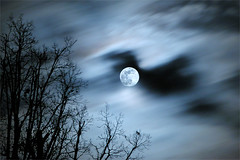At first glance, Glen Duncan's The Last Werewolf looked to me like pure candy. A genre tale told with literary panache, it centers on Jake Marlowe, a 200-year-old lycanthrope who has just discovered that he's the last living werewolf. Not a great way to start your day, and the news only gets worse from there. The top assassin for the World Organization for the Control of Occult Phenomenon (WOCOP) plans to strike off Jake's head at the next full moon. The ancient vampire cabals, who have their own arrangements with WOCOP, want him for nefarious research purposes. And a bizarre virus keeps him from spreading the wolf's curse to others. How would he escape the eradication of his entire species? I couldn't wait to find out.
Only the book didn't unfold like some supernatural survival thriller. Not at all. After a couple centuries of feasting on human flesh every month, Jake has become a downbeat nihilist. Darwin and Nietzsche have killed God (at least in his view), and with them went any intrinsic meaning to existence. Good scotch, chain smoking, and kinky, joyless sex with whores whom he dislikes are Jake's primary means of self-medication. His pessimistic mulling over the Big Questions of Life makes for interesting philosophizing, but the concomitant lassitude means that every happens to him, not because of him. And that turns into some pretty frustrating plotting.
Does it sound as though I'm slamming The Last Werewolf? Because I'm really not. Duncan has writing chops, no doubt about it. Readers get treated to incredible prose, intricate worldbuilding and awesome action. Yet the book also contains embarrassingly explicit sex, nihilism in scads and a plot twist that comes dangerously close to a deus ex machina. Without getting too spoilery, let's just say that Jake manages to wring bloody meaning from this turnip of a world through really hot, monogamous intercourse. "Live," he intones near novel's end. "There's no God and that's His only commandment." In other words, the biological imperative transforms him from a hopeless moper to a happily hedonistic existentialist. The ending is tautly composed, so much so I doubt that many readers will be able to put the novel down once they enter its last quarter. But I also suspect that their opinion about the philosophical foundations upon which The Last Werewolf's action is built will heavily depend on their presuppositions. To my way of thinking, it seemed a house built on sand.
(Picture: CC 2008 by Sky Noir; Hat Tip: The Truth About Lies)
Friday, October 12, 2012
Subscribe to:
Post Comments (Atom)



No comments:
Post a Comment